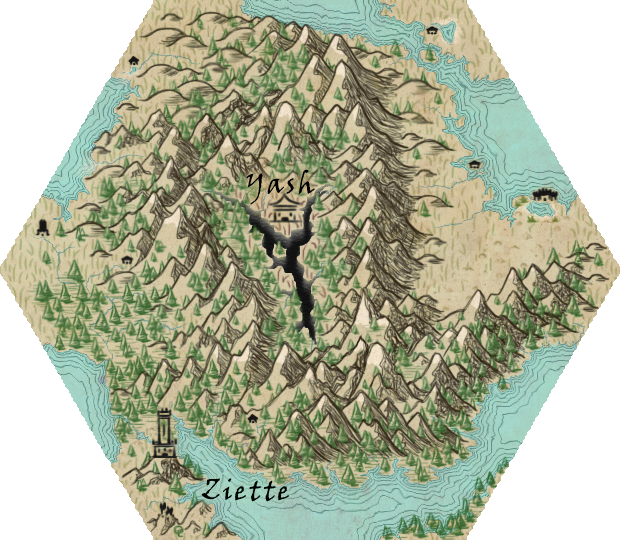





























































































































City of isolation and stoic introspection. Yash sees few visitors – most outsiders are here seeking its fabled cures. Yasheen bloodgrass is said to cure any human ailment. The truth is more complicated, but the grass – endemic to the Yasheen Vale – does indeed have great value.
Yash sits next to a massive fissure rumored to be the gateway to the land of the dead. The locals never deny this; they like to say “But of course, you will indeed enter the land of the dead if you try climbing down into the fissure. Why don't you do that now?” Yasheen are not particularly fond of visitors.
Cultural Influence: 1 The Yasheen are renowned for their dry, spiteful, sarcastic, passive-aggressive humor. Though they are much more positive and friendly toward each other, this is the face they present to the world. They present little else to the world, and are thus of little cultural significance.
Economic Influence: 5 Yash does not have a sophisticated, well-integrated economy. What it does have is a very significant trade surplus despite the fact that it is very, very hard to get to. Why? Exceptionally valuable bloodgrass and other medicinal plants, which have become essential components of any high-end healer’s kit.
Military Influence: 2 The Yahseen don't understand how armies work. It has a city watch that could probably be used as an army if Yash got really creative.
Defense: 5 (due only to its location, really. Significant natural defense due to the nigh-impassable mountains and great rift, but very little non-natural defenses.)
Yasheen Governance Building, Iconic Structures & Landmarks: Building, Other Building, That One Building, Tent.
City of overwrought high-culture pomposity, difficult-to-navigate social mores, arbitrary language barriers, and more fancy titles than people.
Ziette's highly ambitious, experimental chefs are always trying to one-up each other, and the city has become famous for its incredible array of cheeses, sugar pastries, and elaborate cuisine in general. Ziette is a city of extravagant feasting – and yet, by all appearances Ziette neither produces nor imports foodstuffs in any notable quantity. Where does all the food come from? The milk and eggs for the cheeses have to come from SOMEWHERE, as do the flours for the incredible breads and pastries – not to mention all the sugar and spirits. The only local farms appear largely decorative or symbolic. The city's many nobles and chefs simply claim that the answer is a “state secret”, but it seems odd that such a massive logistics issue could be such a well-kept secret. Outsiders – and Ziette's impoverished yet well-fed commoners – have an abundance of theories, each more elaborate than the last: everything from summoning and blood rituals to secret underground farms to smugglers' ships that import food in the dead of night so as to maintain the city's self-reliant image.
Ziette has not one, but four local languages. One of them was constructed quite recently and is used exclusively by the city's chefs. Another language is for the nobles, and the two others are for Zieish tradespeople. Speaking the common tongue of Terra Trema marks someone as being, well, common.
Cultural Influence: 12 Most of the greatest advances in culinary theory in the past generation came from Ziette. However, since Ziette's fancy dishes are impractical things designed to impress more so than feed, most of the world's common folk haven't even heard of Zieish cuisine – let alone be able to afford it.
Economic Influence: 6 Though Ziette is almost literally swimming in decadent food, it doesn't export much – just recipes, samples, and its famous chefs. Rumor has it that Zieish food will spoil the moment it leaves the boundaries of the city-state – but these rumors are surely exaggerated.
Ziette exports some timbers and semiprecious minerals mined beneath the city; nothing too substantial, but enough to attract merchants and trade vessels.
Military Influence: 4 Ziette has a bloody, militaristic history – a quirk that is reflected in its war monuments and its nobles' fancy titles. Yet little else of that history remains; modern-day Ziette is a city of decadence and complacency, with little stomach for conflict. The nobles can assemble the commoners for war, but the closest things to a standing army are the city watch and the royal pastry guard.
Ziette is rumored to possess some manner of magical bioweapon, so rivals are a little more hesitant about direct confrontation than they might be otherwise.
Ziette is also a source of old-style tapestries, ceremonial weaponry, and cooking & baking equipment – some of which is actually practical.